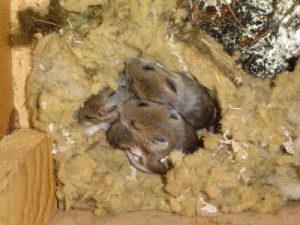 A Small Noise That Turned Into a Big Problem. Last winter, a Maplewood homeowner heard what sounded like a faint scratching behind her kitchen cabinets. She brushed it off—probably just the wind, she thought. A few weeks later, she noticed small chew marks near the pantry, then droppings, and finally a musty odor in the basement. By the time she called for help, mice had chewed through insulation, gnawed electrical wiring, and contaminated storage areas. What began as a minor nuisance had turned into thousands of dollars in repairs—an expensive reminder that delaying wildlife removal can cost far more than acting quickly.
A Small Noise That Turned Into a Big Problem. Last winter, a Maplewood homeowner heard what sounded like a faint scratching behind her kitchen cabinets. She brushed it off—probably just the wind, she thought. A few weeks later, she noticed small chew marks near the pantry, then droppings, and finally a musty odor in the basement. By the time she called for help, mice had chewed through insulation, gnawed electrical wiring, and contaminated storage areas. What began as a minor nuisance had turned into thousands of dollars in repairs—an expensive reminder that delaying wildlife removal can cost far more than acting quickly.
Stories like this are extremely common across Minnesota. Whether you manage rental properties or care for your own home, waiting too long to address wildlife issues almost always results in more damage, more cleanup, and more stress.
Why Delaying Wildlife Removal Is Costly
Wild animals—especially mice—multiply rapidly and spread fast. A single mouse can produce up to 60 babies in a year, meaning a “small” problem doesn’t stay small for long. If you ignore noises, droppings, or damaged insulation, you’re giving pests time to build nests, create entry points, and chew through critical building materials.
- Structural Damage Increases Over Time
Mice and other pests often nest inside walls, ceilings, and attics. In doing so, they:
- Destroy insulation
- Chew wood and structural supports
- Create tunnels through drywall
- Leave behind urine and feces
The longer they live inside your property, the more repairs are needed—and the more expensive the restoration becomes.
- Electrical and Fire Hazards
Chewed wiring is one of the most dangerous long-term consequences of delaying action. Mice instinctively gnaw to keep their teeth filed down, and electrical lines are a common target. Exposed wiring increases the risk of:
- Electrical shorts
- Appliance failures
- House fires
A simple infestation can quickly turn into a major safety hazard if left untreated.
- Health Risks Multiply
The longer pests live indoors, the more they contaminate surfaces, food storage areas, and air quality. Their droppings and urine can carry bacteria and allergens that trigger respiratory problems, especially for children, pets, and elderly tenants.
Property managers in particular must act quickly—not just to protect buildings, but to reduce liability and maintain safe living environments.
When homeowners or property management teams notice early signs of mice or wildlife activity, they often aren’t sure how big the problem really is—or how fast it’s growing. That’s where Minnesota Wild Animal Management LLC comes in.
Our team specializes in:
- Fast, humane wildlife removal
- Complete inspection of all entry points
- Long-term sealing and repair solutions
- Sanitation and restoration of contaminated areas
We focus on finding every hidden access point, repairing damage the right way, and preventing pests from returning. Many companies stop at trapping; we ensure your home or rental units are secure and protected long-term.
And because mice multiply quickly and hide well, the sooner you call, the more affordable the solution becomes.
Early Action Saves Money and Prevents Major Damage
Whether it’s mice, squirrels, bats, or another wild critter, ignoring the signs allows the problem to escalate. A single delay can mean the difference between:
- Minor repairs or complete attic restoration
- Simple exclusion work or full electrical rewiring
- A quick cleanup or a major health hazard
Property managers also benefit from quick action—fewer tenant complaints, fewer maintenance calls, and fewer emergency repair bills.
If you believe you may have wildlife activity, even if you’re not yet certain, reaching out for an inspection is always the smartest move. One call to Minnesota Wild Animal Management LLC can save you thousands in long-term repairs and give you peace of mind.
Delaying mice removal and repairs doesn’t just give pests more time to multiply—it gives them time to damage your home, threaten your safety, and increase the cost of restoration. Acting early protects your property, your investment, and the people who live inside it. If you suspect wildlife may be hiding somewhere in your home or rental unit, how long do you want to wait before the problem becomes even more expensive?



